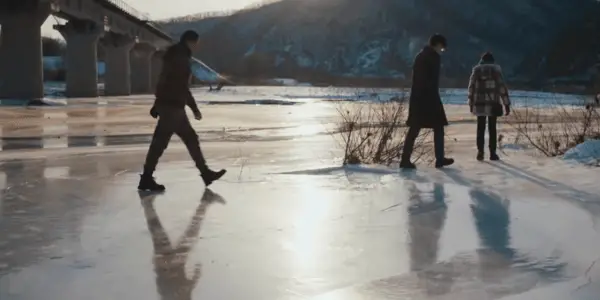
Anthony Chen’s films are all fascinated by disparate relationships between class and race and it stems from his remarkable debut film Ilo Ilo (2013), in which a Filipino immigrant maid in Singapore finds herself tending for a difficult and wealthy-elitist Chinese immigrant family.
source: Strand Releasing
While Chen has yet to make another feature that matches or surpasses his debut, The Breaking Ice is his best film since then. Following Wet Season (2019), Chen set his sights beyond the borders of his home country. While Drift (2023) was an interesting failure that clearly showed Chen beyond his depth as a social critic, The Breaking Ice is closer to home both geographically and politically.
A Mix of Class and Geography
Taking place in the northern Chinese province of Manchuria, close to the Korean border, the movie begins with a tour guide named Nana (Zhou Dongyu) explaining to a group of Chinese tourists who are here from the South for a wedding about the large ethnic Korean population in Manchuria and the slight linguistic differences between their greetings and those of Koreans who live in Korea. She seems exhausted with the monotony of the job but maintains a light sprite around the tourists. Her mood changes when she chats up one of the tourists, a wealthy young man named Yaofeng (Liu Haoran) from Shanghai. After she invites him to hang with her and her boyfriend, a grocery shipment driver named Han Xiao (Qu Chuxiao), the friendship dynamic creates a strange ménage-à-trois situation that mixes class and geography of China.
A Winding Road
Chen’s strength as a filmmaker comes from the granular dynamic shifts between his characters and a generally empathetic view of humanity. Unlike in Ilo Ilo where there is an uncomfortable tension and an immediate rift between its two central characters that eases out over time, The Breaking Ice is more like a flat winding road.
source: Strand Releasing
That sounds like an insult, but there is a strangeness to the film’s balance of its awkward trio with troubled personal pasts with the freeing spirit of youth that makes the whole ordeal hypnotic. Chen couples this with some beautiful camerawork of the vistas, using the winter ice that the film plays as an aesthetic metaphor for positioning his characters to relay their fluctuating relations with each other throughout the movie.
Conclusion
Even as each character’s past and secrets begin to be intimately revealed and come back to haunt them, the film stays away from melodramatizing the situations. It really embodies the characteristics of feeling lost in youth, wind-swept, and going along as if there’s nothing to lose. Despite the film’s clear highlighting of class dichotomies between the rich corporate Yaofeng and working-class Nana and Han Xiao, it finds a sympathetic commonality in all of them in the mysteries of youth. Each spontaneous decision and plot point feels organic because of this naturality and deep understanding of the characters. Every time The Breaking Ice seems to be on the brink of shattering, it glides.
The Breaking Ice had a limited theatrical release in the U.S. on January 19, 2024
Does content like this matter to you?
Become a Member and support film journalism. Unlock access to all of Film Inquiry`s great articles. Join a community of like-minded readers who are passionate about cinema – get access to our private members Network, give back to independent filmmakers, and more.




